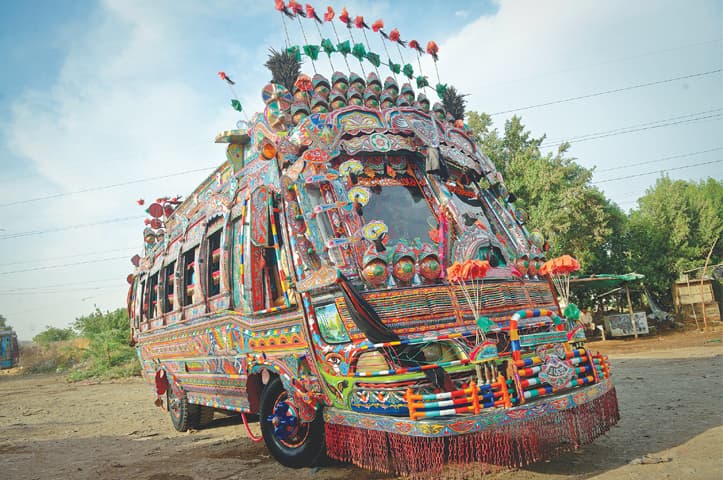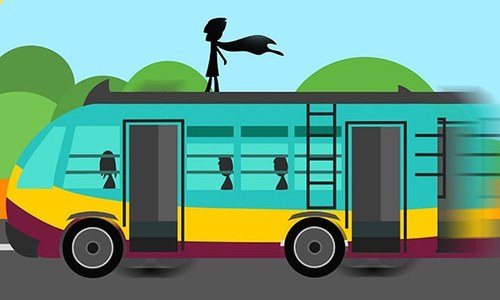
Until a few years ago, amongst its many other distinctions Karachi was known for three key features.
“The sea, violence and curfews, and of course the W-11 minibus route,” laughs Amir Raza as we sit in his cubbyhole office in Ahsanabad, about a kilometre from the Super Highway. “The sea will be here forever. We don’t have curfews any more but you never know about the violence. But W-11 — it’s soon going to be history, I fear.”
His fears may not be exaggerated. Sitting here at the Ahsanabad W-11 terminal, one can see it happening. Once called the raani (queen), this 40-year-old city transport route is fading fast due to inflation, ageing infrastructure and complicated regulatory issues.
I can count 27 buses parked at the terminal during the peak hours of a weekday. None of them looks anything like what W-11 was famed for. The vehicles’ bodies are rotting, most lack the music systems that once made this route’s minibuses so groovy, there is hardly any exterior artwork and the less said of the interior, the better.
Read: Karachi’s Green Line bus will be more beautiful than Lahore metro: PM Nawaz
“You will not find that kind of decorated exterior any more,” Raza tells the photographer accompanying me. “Let me see if I can help you.”
He calls someone with his mobile phone. A few minutes later, a bus that is decorated better than the ones we have seen so far eases into the terminal. “It had gone for some tyre work and I called the driver to bring it here to show you,” says Raza. “This is the only shahzadi (princess) at the terminal right now. The rest are all churail soorat (witch-like), just like all the city’s other minibuses.”
From 1979 to early 2000, a W-11 ride meant more for Karachiites than travelling from one point to another. It used to be a fun-packed experience, offering luxuries none of the vehicles on any of the other routes offered. From New Karachi to Keamari and along long stretches of Shahrah-i-Pakistan and M.A. Jinnah Road, each W-11 minibus was a giant, highly decorated piece of metal with hi-tech music and comfortable seating. But over and above these comforts were the speed and availability of the service. A dozen minibuses would be found at any one time on any of W-11 route’s roads, all packed with passengers. At that time, nearly 400 minibuses plied the route and the popularity of the service was such that W-11 was a household name.
“The number of buses has declined to 100 now,” says Muhammad Abid, who manages fleet operations. “And of these, hardly 80 ply the roads every day. When the service was at its peak of excellence, a bus used to leave the terminal every minute. Now it takes 20 minutes for each bus to leave after the last one. The owners of the buses are not making any investment because of the higher cost of maintenance. The pair of tyres that once cost Rs4,000 now costs Rs28,000. Other expenses have increased at a similar ratio.”
Noor Muhammad, better known as Lakho, has been driving along this route for 27 years. He explains that in the good old days, people used to admire him for plying this route. “Such was the popularity of the service that every second or third roadside teashop or eatery would be named W-11,” he says. “You will remember that a music album of Indian songs was launched by the local company here as FM W-11. I remember when the owners and operators of the buses on this route were invited to parties by diplomats. We used to take our buses to their functions to show them off. The British Council, the US consulate, the Australian High Commission — we visited everywhere due to W-11’s popularity.”
Lakho believes that things started changing around 15 years ago, when the city’s transport system took a downward turn, never to revive. His thoughts echo the conclusions of a report that says that Karachi’s public transport sector is on the verge of collapse because of sustained neglect and a lack of follow-through in both government and public-private partnership projects.
Titled Karachi: The Transport Crisis, the report was compiled by city planner and architect Arif Hasan along with Mansoor Raza and the staff at the Urban Resource Centre. Published over a year ago, it says that a city of an estimated 22 million people currently has roughly 9,527 operational minibuses, as compared to the 22,313 it had in 2011. The Karachi Metropolitan Corporation says that an additional 8,676 large buses are required to meet the shortfall.
Of the city’s 329 official bus routes, only 111 are currently being operational; the others have been abandoned because “they are not considered lucrative by the transporters,” says the report. The current state of route W-11 seems to have become another casualty.
“A couple of years ago I brought my son and son-in-law here as drivers,” says Lakho. “But they stayed for hardly six months. One left to get a driving job in a Korangi factory and the other decided to buy a CNG rickshaw on instalments. Today, they are both earning more than I am.”
Published in Dawn, April 19th, 2016














































